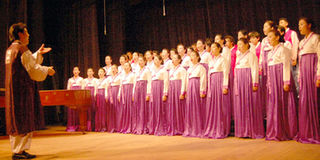Korean choir speaks the universal language of music

Suwon Civic Chorale members led by Dr In-Gi Min during the concert at the National Theatre. PHOTO BY STEPHEN OTAGE
The opportunity to watch a professional chorale performing at the National Theatre was impossible to resist. In a country devoid of such companies, attending the Suwon Civic Chorale’s performance was a no-brainer.
They were quite impressive with their diverse and rich sound, and their mastery of their repertoire was amazing considering that it included a number of English songs, English not being a widely spoken language in South Korea, where the choir originates.
The first item was a Korean art song, Our Beloved Mt. Geumgang, which pines for the unification of the two Koreas. Mt. Geumgang, a mountain in North Korea, was one of the few places South Koreans could visit freely in the North and acted as a symbol of reconciliation until Pyongyang sealed it off in 2008. The second item, brisk and light-hearted when contrasted with the sedate Mt. Geumgang, was, according to the programme, A Young Lady Who is Picking the Herbs.
Most of the songs were in Korean, but the melodies, drama and the intensity with which the two were fused spoke a universal language. Blue Bird was inventive, requiring two solos, a tenor and an alto, to mimic the cries of several birds. There was also a zestful take on Arirang, a popular South Korean folk song.
I was eager to see them perform the African traditional music listed on the programme but they did not, and no explanation was offered as to why. Instead, they performed a number of opera classics, among them O Mio Babbino Caro, Hallelujah and La Traviata – Brindisi. These were recorded and played out on the Theatre’s speakers, the Philharmonic part of the ensemble having remained home. There was also an exploration of a few Negro spirituals, which were done rather snappily, with little soul.
This was their last performance after shows at Speke Resort Munyonyo, Makerere University and Kampala City Council Authority. The audience was made up of mostly Koreans, and Dr. In-Gi Min, the music director and conductor, utilised the breaks to sustain them in conservation.
He could have been delineating the items, but then how could I tell? It was a unique, beautiful experience for me, and, judging by the applause, for the audience too.




